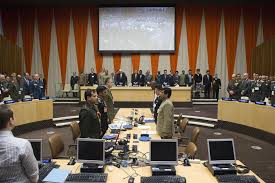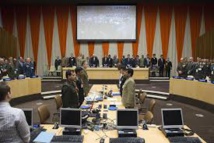New York- 27 March 2015 – The Secretary General has marked the day at the conference of United Nations’ Defence Chiefs by making an appeal for more contribution of troops to all the higher military authorities present there. The troops, thus acquired, from various States across the globe will also be a call for joining in with a global political purpose. In Mr. Ban’s words:
"We need unity and backing. Effective performance demands broad consensus on why, where and how peacekeepers carry out their mandates.”
The international conference event proved to be a historic one. All the major defence officials coming from all the “Member States”, which equates to more than hundred in numbers, took up pressing matters such as the role of U.N. in peacekeeping matters to be expanded in a broader spectrum between the Member countries, promoting peacekeeping partnership and effective implementation of the said directives in an efficient manner.
The meeting took place in the chamber of ECOSOC which extended into the entire length of the day in the presence of Hervé Ladsous, Peacekeeping Operations’ “Secretary-General” and Atul Khare, General Secretary of Field Support.
Mr. Ban informed the soldiers present in the gathering, by highlighting the increased death rate of people, including soldiers, that is on a yearly rising graph to be an immensely worrying situation, imposing a threat to the peacekeepers’ missions. He says:
“Before 2000, there were four times when more than 100 peacekeepers lost their lives in a single year. Since then, we have suffered that tragic toll ten times. Consecutively, 10 times...
Keeping the issues at the Central African Republic and Mali in mind, he adds:
“Over the past two decades, the Security Council has given peacekeepers increasingly challenging mandates. Even in traditionally static missions, such as UNDOF, in the Golan Heights, there can be sudden changes in the operating environment.”
The gathering observed a few moments of silence in honour of the “fallen peacekeepers”. Mr. Ban also addressed the soldiers’ hardships and challenges which take them to the “most dangerous places” on earth wherein they responsibly defend the innocent people “on the front lines of human misery”.
Recalling the peacekeepers’ role, Mr. Ban added the foremost one to be the provision of security to the common civilians from any kind of violence. Over the years they have brought in stabilisation, strengthened the legal rules and regulations, extended the authority of the state and addressed various issues on gender equality and on human rights. As for him:
“With such diverse responsibilities, peacekeepers can bring comprehensive stability – when they have the right capabilities and political will to succeed. The needs are rising – but the resources fall short. I have appointed a High-Level Independent Panel to address the serious difficulties we face.”
Mr. Ban put forth a call to all the nations to join in during this momentous hour of crisis to redeem the world from terrorism, crimes, conflicts, and health emergencies that are increasing the challenging complexities of the “global security landscape”. Therefore, it is the demand of such hour that intelligent forces and other support systems work in collaboration with the peacekeepers to ensure smooth functioning and better management.
Peacekeeping is an equal responsibility of all the nations which should be matched with “stronger international partnership” in answer to the “largest deployment in history”. Thus, Jan Eliasson, deputy Secretary General’s closing words, addressing the crowd, were:
“We hope that your Governments will continue to engage actively in this renewed international dialogue on peacekeeping,” he said. “The risks in peacekeeping will always be high. The stakes are life-and-death. When we succeed, we prove to the world's most vulnerable people that, fundamentally, the most powerful soldiers are those without enemies. We show that true strength is built on universal values laid down in the UN Charter.”
References:
http://www.un.org/apps/news/story.asp?NewsID=50437#.VRY3YY6Uf1U
Peacekeeping Missions to Attain A New Dimension In Collaboration With The Member Nations
03/30/2015 - 14:49
The conference of U.N. Defence officials made an historic appeal. The U.N. Secretary General invites the nations to join hands with peacekeeping missions.
More
Friday, February 20th 2026 - 02:08 FT: JPMorgan is in talks to provide banking services to Trump's Board of Peace |
Thursday, February 19th 2026 - 08:27 Wall Street Journal: All US troops will be withdrawn from Syria within two months |
Most Popular
 Trump criticizes renewable energy in Davos
Trump criticizes renewable energy in Davos
01/22/2026
Innovation & tools
Discovery


















